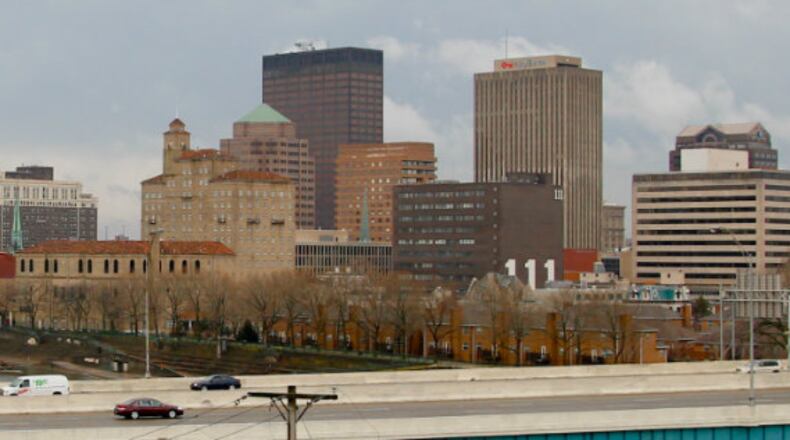Credit: DaytonDailyNews
But the definition of such cities remains murky: While cities such as Dayton have have campaigns aimed at welcoming immigrants, the federal funding source for such cities remains unclear, and the order says funding cannot be withheld in violation of the law or when federal dollars are needed for law enforcement.
“Beginning today, the United States of America gets back control of its borders,” Trump told employees of the Department of Homeland Security at the department’s headquarters in Washington.
RELATED: Welcome Dayton program under fire again
Dayton launched its Welcome Dayton program in 2011 in an effort to encourage immigrants to move to the city and help boost population.
Jessica A. Ramos, an attorney who focuses on immigration at Advocates for Basic Legal Equality, said in an interview last year she would not call Dayton a “sanctuary city.”
“Dayton is trying to be a welcoming place for everyone regardless of whether you are a U.S. citizen or whether you are a refugee. We are trying to make people feel welcome.”
After the terrorist attack in Brussels last year, Montgomery County Sheriff Phil Plummer criticized the Dayton program saying that he believes the city offers sanctuary to immigrants here illegally.
“We have to properly vet those coming into our country,” said Plummer, who is also chairman of the Montgomery County Republican Party. “We can’t just let every immigrant in.”
The actions, which President Trump announced in a ceremony where he also honored the parents of people killed by illegal immigrants, are expected to be the first in a series of sweeping actions aimed at tightening immigration.
More action coming from President Trump
Later this week, according to draft documents obtained by The New York Times, he is expected to announce a month-long halt to admitting any person in the United States from Syria, Iran, Iraq, Libya, Yemen, Sudan and Somalia. Refugee admissions would be stopped for 120 days while the administration reviews screening procedures. But when the program resumes, the Times reported, the program would be more than halved, with 50,000 permitted in compared to the current 110,000. The documents are subject to change up until he signs them.
Ohio Gov. @JohnKasich says to give President @RealDonaldTrump a "chance" https://t.co/0bDp7w4Qaw pic.twitter.com/KffzzGAm1y
— Ohio_Politics (@Ohio_Politics) January 26, 2017
Columbus holds the second largest Somali community in the nation, with only Minneapolis-St. Paul hosting more. According to the Somali Community Association of Ohio, Ohio has the second largest Somali population in the U.S., with between 15,000 and 40,000 Somali immigrants and refugees living in Columbus.
The city’s Somali population drew unwanted attention in late November, when Abdul Razak Ali Artan, an 18-year-old Somali-born student who came to the United States in 2014 legally as a refugee, drove into a group of pedestrians on OSU’s campus, then emerged from his vehicle to stab people with a butcher knife.
Eleven people were sent to the hospital with injuries. A campus police officer shot and killed Artan at the scene. In the aftermath of that attack Trump – who vowed in the campaign to better vet those from Muslim countries – visited the campus to offer his condolences.
Omar Hassan, the director of the Somali Community Association of Ohio, declined to comment on the rules, saying he wanted to see them first. “We will talk when we see the action,” he said.
How the orders will translate into reality remains to be seen. While one of the order calls for the wall, the order does not cover the cost of the wall. Trump has promised that Mexico will ultimately reimburse the United States for the costs of building the wall.
Trump’s Wednesday actions caused immediate outcry from groups that advocate on behalf of immigrants.
Beth Werlin, executive director of the pro-immigrant American Immigration Council said the policies were an attack on immigrants. The actions, she said, “sends a signal that America is closed for business and that our doors are shut to those in need.”
But among the supporters of the actions was Rep. Jim Jordan, R-Urbana, who called the moves “the first step toward securing our country from illegal immigration.”
Ohio Gov. John Kasich, visiting D.C. for a panel discussion at the Embassy of the Netherlands, said he had not yet seen the executive actions.
“I think it makes good sense for us to review our immigration policy here in the United States,” he said. “We have a big chunk of people who come in here, they are supposed to leave; they don’t. It’s important that we know who the people are that are coming in that they’re properly vetted. I just think that makes perfect sense.”
About the Author
